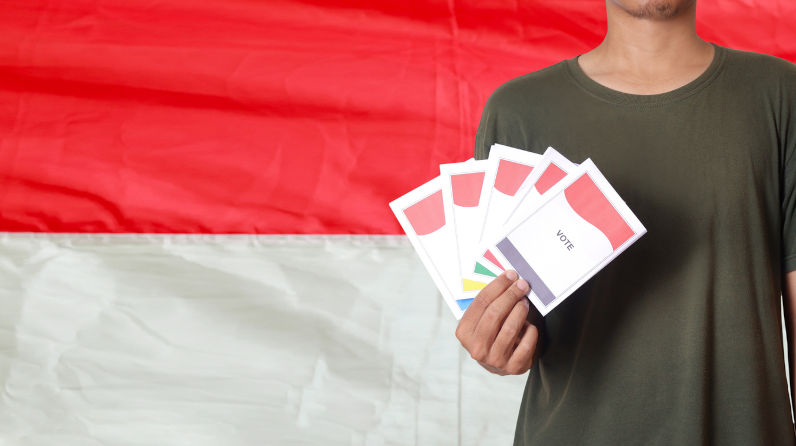2024 Election: Indonesias Prabowo will not rule in anyones shadow
February 12, 2024
On 14 February, Indonesia holds simultaneous elections for the presidency and national and regional legislatures. The runes suggest the current Defence Minister, Prabowo Subianto is on track to be the next President. He will not be boring.
To win a presidential election, a presidential/vice-presidential ticket must gain more than 50% of the vote. If none so prevails -as might occur where there are three or more tickets- a runoff is held between the two leading tickets with the third dropping out. If a runoff is held this year, it will be on 26 June. The new president will be installed on 20 October.
The candidates for President are Prabowo whose running mate is Gibran Rakabuming Raka, son of the current president, Joko Widodo; Anies Baswedan, a former University President and Governor of Jakarta; and Ganjar Pranowo, the former governor of Central Java.
So far, Prabowo is leading easily, with most polls putting him in the mid to high forties with a couple over the fifty percent threshold. The other two candidates are at around twenty percent with Anies a tad ahead.
The immediate issue is whether Prabowo wins in one round or whether the process drags on to a second with the two leading candidates vying for the votes of the third.
The runoff would be unlikely to change a win for Prabowo but would introduce an element of uncertainty and four months more of campaigning could put strains on Prabowos health.
Now 72, Prabowo has always attracted interest. His father, Sumitro Djojohadikusumo, was a brilliant economist who served as a minister under Indonesias first president, Sukarno, and his successor Suharto.
Prabowos mother was a protestant, his brother Hashim is a fundamentalist christian and one sister is married to a catholic. Nominally a muslim, Prabowo was married to one of Suhartos daughters until 1998.His father had a period of exile under Sukarno during which Prabowo and his family were educated abroad. So unlike, say, Suharto or Widodo when they came to power, Prabowo has had major international exposure.
He has a dark side. As an officer in the Special Forces, he was alleged to have behaved with brutality in East Timor and Papua. And in 1998 he was dishonourably discharged from the army largely for alleged human rights abuses. For many years he was denied entry to the United States. After 1998, he went into self-imposed exile for a period.
But Prabowo returned. By now he has had plenty of political experience. He was the running mate to Sukarnos daughter Megawati Sukarnoputri in her unsuccessful bid for the presidency in 2009.He ran unsuccessfully as the sole candidate against Widodo in 2014 and 2019. Appointed by Widodo as defence minister after the 2019 elections, he has handled the portfolio competently.
Despite his age, Prabowo has been active on the hustings. His decision to have Widodos son as a running mate was also tactically smart. This has given the ticket youth and crucially the Presidents popularity has rubbed off on Prabowo.
Prabowo has had something of a political makeover. With a new generation of voters, the Darth Vader image of old has faded. He has become avuncular. He has an attractive energy.
These are some of the things we will need to watch.
First, Prabowo is smart. He is also emotional and erratic. He is known to ignore good advice.
Second, he will be tempted to overspend. He had had run-ins with the disciplined Finance Minister, Sri Mulyani. Some aspects of his platform EG free school lunches for all, will be expensive.
Third, Widodos adherence to the reformist principles he had earlier endorsed -such as commitment to democracy and probity in government-waned with time. He has undermined the independence and effectiveness of key institutions such as the Anti-Corruption Commission and the Constitutional Court. (An egregious example was when Widodos brother-in-law, the President of the court, ruled in favour of changing electoral rules to permit Widodos son to run as vice president.) On Widodos watch, Indonesia has lost ground in the Freedom House and Economist Intelligence Unit democracy indices.
It is unlikely that Prabowo will reverse this trend. He has never been a convinced democrat and has been critical of democratic strictures. When Widodo leaves for Prabowo a flawed democracy, Prabowo will have more on his mind than to repair it.
Fourth, will Widodos ambitions for a Great Indonesia flow through to Prabowo.? Yes, but his outlook may not be identical. There are no major signs his approach on foreign relations will be much different to Widodos. But he may be more mindful of security issues. Moreover, Prabowo has a strong nationalist streak which may be manifested in foreign policy decisions-including about China.
Fifth, Prabowos approach to Australia is positive. The relationship has not always been plain sailing and may not be in the future. But he has personal relationships - particularly through the army - of long standing.
Finally, Widodo wants to be remembered for many things including improving the lives of Indonesians and his role in Indonesias rise as a major power. Central among his ambitions is a new capital in Kalimantan. His legacy is one reason he wants his son as Vice-President.
However, Prabowos history - including his humiliation in 1998 and his long battle to be president - does not suggest he will rule in anyones shadow or that his political loyalties will be anything but pragmatic. He has waited a long time. He has a sense of his own destiny and wants his place in history. It will be his legacy -not Widodos -which he will have in mind.
First published in the AFR, February 9 2024
